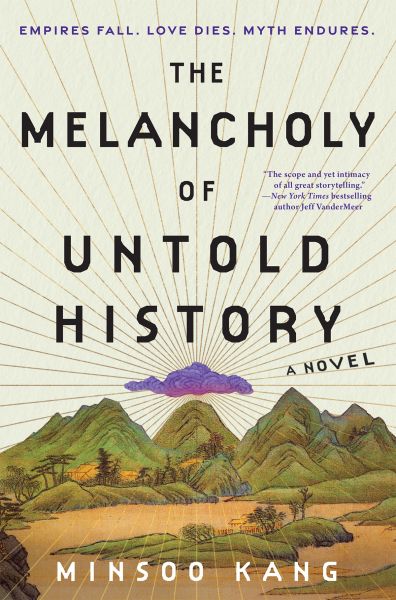Wildest Dreams
The Melancholy of Untold History
By Minsoo Kang

30 Aug, 2024
Minsoo Kang’s 2024 The Melancholy of Untold History is a secondary-universe history… of sorts.
What, if anything, do a doomed storyteller, four angry gods, and a heartbroken historian, have to do with each other?
In the time of myth, Green Mountain Goddess, Red Mountain God, Yellow Mountain Goddess, and Blue Mountain God gather to drink, eat, and socialize. Waking after a drunken stupor, Red Mountain God, Green Mountain Goddess, and Blue Mountain God fall to arguing over the single peach growing on a tree in Red Mountain God’s garden. While the other three argue, Yellow Mountain Goddess covertly steals the peach and leaves. Incorrect accusations follow over who stole the peach. Ancient friendships end.
Angry with each other, the gods invest a surprising length of time sabotaging each other. All signs point to the vendetta ending badly for each of them and for the humans unlucky enough to be their pawns. No god can set aside wounded pride. All of the gods end up stripped of their divine status and incarnated as the very humans caught in the endless conflict.
In time as humans measure it, a storyteller has the enormous misfortune of having a knack for spinning tales. Illiterate, he has an excellent memory. The storyteller is also adept at reframing old stories. His delighted audiences are assured of novelty. In the short run, this ensures fame for the storyteller. In the long run, doom.
The emperor commands the storyteller to travel to the glorious new city commissioned by the emperor. After three years of hard work creating novel stories, the storyteller finds himself imprisoned, along with everyone else in the city. The storyteller realizes that he and everyone else who took part in the project are slated for execution. Why it pleased the emperor to do this is a mystery.
Living centuries after the unlucky storyteller, the historian had consigned himself to an intellectually fruitful but lonely life. The fame that followed an unexpected discovery was unexpected. Far more unexpected, meeting a woman with whom he immediately fell in love. A joyful marriage follows… until his wife dies in a helicopter crash.
Alone again, the widower struggles to maintain interest in life. The affections of a graduate student (who has her own deeply troubling problems) are appreciated but do not really address the historian’s grief. In any case, the affair will be brief. What then is the historian to do?
~oOo~
Only two thirds of the way through 2024 and I have a book I will definitely nominate for a Hugo.
Apparent early on: the structure parallels the historian’s own belief about the stories civilizations tell about themselves: first, mythological tales of gods and monsters, then historical about the great leaders who shape history, and finally attention falls on the lives of common folk. What an extraordinary coincidence that the structure should parallel the historian’s thesis!
The narrative weaves back and forth between mythological time, historical time, and contemporary time. The order in which the viewpoint leaps back and forth may seem haphazard. Readers might even wonder if this is really a novel, rather than a collection of loosely connected anecdotes.
There is a grand, unifying perspective from which all of the events become different facets of the same unified whole. Kang is in no hurry to provide it, but readers frustrated with the structure should take comfort. Perseverance will be rewarded.
The novel is about many things: myth, and the lessons it teaches, history, and how nations assemble it, and ancient and personal affronts and how to deal with them. Oh, and also the utility of therapy, even for gods. Kang’s execution is skillful, and I was delighted to have encountered this book.
The Melancholy of Untold History is available here (Amazon US), here (Amazon Canada), here (Amazon UK), here (Apple Books), here (Barnes & Noble), here (Chapters-Indigo), and here (Words Worth Books).
